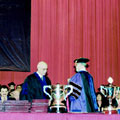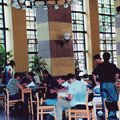|
|
 |
 |
 |
 |
 |
|
 |
 |
 |
 |
 |
|
 |
|
 |
|
 |
|
|
|
 |
|
|
|
 |
|
|
|
|
|
Arabic Language Institute
School of Humanities and Social Sciences
Professor: El S. Badawi (Director, Arabic Language Institute)
Associate Professor: A. El Gibali (Director, TAFL Program)
Interest in the Arabic language has increased greatly throughout the world. With this has come a demand for professionals trained in the field. Based on modern theory and practice, the master's degree and the diploma programs in Teaching Arabic as a Foreign Language (TAFL) are especially designed to meet this need.
Master of Arts
The master's degree requires two years' residence and covers the following areas: linguistics, contrastive analysis in second-language teaching and learning, and methods of teaching foreign languages. In addition, practice teaching is required. The courses have been structured to promote research as well as to develop highly trained teachers. In addition, a number of issues related to the role of Arabic in modern society are freshly examined, such as current methods of teaching Arabic to children, reform of the writing system, grammar reform movements, and the problem of diglossia. The TAFL program seeks to inspire new approaches to these problems.
Admission
Applicants for the master of arts degree in TAFL should hold a bachelor of arts degree specializing in Arabic language, Islamic studies, Middle East area studies, or a modern language. Applicants should also meet general university admission requirements. Applicants with undergraduate specialization in a modern language other than Arabic must take a number of additional courses in the field of Arabic studies. Applicants for the master of arts degree in TAFL should have teaching experience prior to admission into the program or must acquire this experience concurrently with the program.
Language
Non-native speakers of Arabic and holders of degrees other than Arabic language or Islamic studies must demonstrate in an examination that their proficiency in Arabic is adequate for study in the program. The level of language proficiency required for admission is not less than the level Superior as specified by the guidelines of the American Council for the Teaching of Foreign Languages (ACTFL). Those with less but showing exceptional promise may be recommended for AUC preparatory training for a period not to exceed one year.
An applicant who is not a native speaker of English must have sufficient command of English to qualify for admission as an AUC graduate student. Those with less but showing exceptional promise may be recommended for AUC preparatory training for a period not to exceed one year.
Courses
A minimum of 30 graduate credit hours and a thesis are required except as indicated in the "Thesis" section below. Required of all students:
|
|
|
TAFL |
501 |
Principles of Linguistic Analysis, 3 cr. |
| |
503 |
Second Language Acquisition, 3 cr. |
| |
510 |
Methods of Teaching a Foreign Language I, 3 cr. |
| |
511 |
Methods of Teaching a Foreign Language II, 3 cr. |
| |
515 |
The Phonetics of Arabic, 3 cr. |
| |
520 |
Research Methods Applied Linguistics, 3 cr. |
|
|
|
Electives should complete the required number of credit hours. Choice will depend upon the thesis topic and the student's undergraduate field of study and must be approved by the adviser. While they are normally selected from among 500-level TAFL courses, with the adviser's approval, electives may include up to two non-TAFL courses. No more than two 400-level courses may be counted toward the degree.
Comprehensive Examination
The comprehensive examination consists of a written examination followed by an oral examination. It is required only of students not writing theses and may not be taken more than twice.
Thesis
The thesis is usually required for graduation. In some circumstances and with the adviser's approval, a candidate may be allowed to replace the thesis with two additional courses, increasing the total number of minimum credit hours required from 30 to 36. In such cases the candidate would be required to take the comprehensive examination.
The student writing a thesis must produce a professional paper on some aspect of TAFL. The thesis must be prepared under the guidance and close supervision of a faculty adviser and a designated committee.
Graduate Diploma in TAFL
The diploma program in TAFL is designed for qualified teachers of Arabic who meet the same admission requirements as those for the masters degree. The diploma is awarded to those who successfully complete the following six TAFL courses:
|
|
|
TAFL |
502 |
Assessment in Language Learning, 3 cr. |
| |
506 |
Resources for TAFL, 3 cr. |
| |
510 |
Methods of Teaching a Foreign Language, 3 cr. |
| |
516 |
The Linguistics of Arabic, 3 cr. |
| |
565 |
Observation and Evaluation of Language Teaching, 3 cr. |
|
|
|
One three-hour elective course to be decided upon by the student in con-sultation with the academic adviser.
A maximum of one appropriate course may be accepted, with departmental approval, as transfer credit toward the diploma in lieu of 502, 510, 516, 565, or an acceptable elective.
TAFL Courses
|
|
| | CourseNum |
CourseTitle |
 |
501 |
Principles of Linguistic Analysis |
 |
502 |
Assessment in Language Learning |
 |
503 |
Second Language Acquisition |
 |
506 |
Resources for Teaching Arabic as a Foreign Language |
 |
507 |
Computer Assisted Language Learning (CALL)/Computer Operations Techniques |
 |
510 |
Methods of Teaching a Foreign Language I |
 |
511 |
Methods of Teaching a Foreign Language II |
Teaching Arabic as a Foreign Language
 |
|
|
 |
 |
|
|
 |
|
|
 |
 |
 |
 |
 |
|
 |
 |
 |
 |
 |
|
 |
|
 |
|
 |
|
|
|
 |
|
|
|
 |
|
|
|
|
|
Arabic Language Institute
School of Humanities and Social Sciences
Professor: El S. Badawi (Director, Arabic Language Institute)
Associate Professor: A. El Gibali (Director, TAFL Program)
Interest in the Arabic language has increased greatly throughout the world. With this has come a demand for professionals trained in the field. Based on modern theory and practice, the master's degree and the diploma programs in Teaching Arabic as a Foreign Language (TAFL) are especially designed to meet this need.
Master of Arts
The master's degree requires two years' residence and covers the following areas: linguistics, contrastive analysis in second-language teaching and learning, and methods of teaching foreign languages. In addition, practice teaching is required. The courses have been structured to promote research as well as to develop highly trained teachers. In addition, a number of issues related to the role of Arabic in modern society are freshly examined, such as current methods of teaching Arabic to children, reform of the writing system, grammar reform movements, and the problem of diglossia. The TAFL program seeks to inspire new approaches to these problems.
Admission
Applicants for the master of arts degree in TAFL should hold a bachelor of arts degree specializing in Arabic language, Islamic studies, Middle East area studies, or a modern language. Applicants should also meet general university admission requirements. Applicants with undergraduate specialization in a modern language other than Arabic must take a number of additional courses in the field of Arabic studies. Applicants for the master of arts degree in TAFL should have teaching experience prior to admission into the program or must acquire this experience concurrently with the program.
Language
Non-native speakers of Arabic and holders of degrees other than Arabic language or Islamic studies must demonstrate in an examination that their proficiency in Arabic is adequate for study in the program. The level of language proficiency required for admission is not less than the level Superior as specified by the guidelines of the American Council for the Teaching of Foreign Languages (ACTFL). Those with less but showing exceptional promise may be recommended for AUC preparatory training for a period not to exceed one year.
An applicant who is not a native speaker of English must have sufficient command of English to qualify for admission as an AUC graduate student. Those with less but showing exceptional promise may be recommended for AUC preparatory training for a period not to exceed one year.
Courses
A minimum of 30 graduate credit hours and a thesis are required except as indicated in the "Thesis" section below. Required of all students:
|
|
|
TAFL |
501 |
Principles of Linguistic Analysis, 3 cr. |
| |
503 |
Second Language Acquisition, 3 cr. |
| |
510 |
Methods of Teaching a Foreign Language I, 3 cr. |
| |
511 |
Methods of Teaching a Foreign Language II, 3 cr. |
| |
515 |
The Phonetics of Arabic, 3 cr. |
| |
520 |
Research Methods Applied Linguistics, 3 cr. |
|
|
|
Electives should complete the required number of credit hours. Choice will depend upon the thesis topic and the student's undergraduate field of study and must be approved by the adviser. While they are normally selected from among 500-level TAFL courses, with the adviser's approval, electives may include up to two non-TAFL courses. No more than two 400-level courses may be counted toward the degree.
Comprehensive Examination
The comprehensive examination consists of a written examination followed by an oral examination. It is required only of students not writing theses and may not be taken more than twice.
Thesis
The thesis is usually required for graduation. In some circumstances and with the adviser's approval, a candidate may be allowed to replace the thesis with two additional courses, increasing the total number of minimum credit hours required from 30 to 36. In such cases the candidate would be required to take the comprehensive examination.
The student writing a thesis must produce a professional paper on some aspect of TAFL. The thesis must be prepared under the guidance and close supervision of a faculty adviser and a designated committee.
Graduate Diploma in TAFL
The diploma program in TAFL is designed for qualified teachers of Arabic who meet the same admission requirements as those for the masters degree. The diploma is awarded to those who successfully complete the following six TAFL courses:
|
|
|
TAFL |
502 |
Assessment in Language Learning, 3 cr. |
| |
506 |
Resources for TAFL, 3 cr. |
| |
510 |
Methods of Teaching a Foreign Language, 3 cr. |
| |
516 |
The Linguistics of Arabic, 3 cr. |
| |
565 |
Observation and Evaluation of Language Teaching, 3 cr. |
|
|
|
One three-hour elective course to be decided upon by the student in con-sultation with the academic adviser.
A maximum of one appropriate course may be accepted, with departmental approval, as transfer credit toward the diploma in lieu of 502, 510, 516, 565, or an acceptable elective.
TAFL Courses
|
|
|
|
|
|
 |
 |
|
Copyright © 2004-2005, The American University in Cairo |
|
|
| |
| | |
